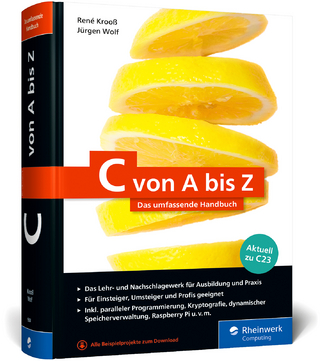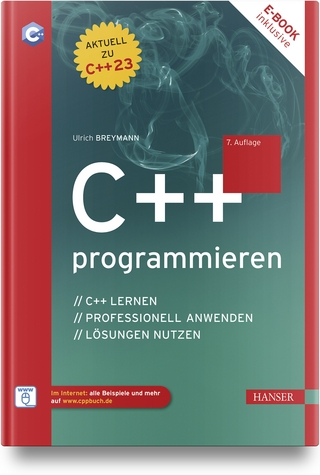
Practical UML Statecharts in C/C++
Newnes (an imprint of Butterworth-Heinemann Ltd ) (Verlag)
978-0-7506-8706-5 (ISBN)
Practical UML Statecharts in C/C++ Second Edition bridges the gap between high-level abstract concepts of the Unified Modeling Language (UML) and the actual programming aspects of modern hierarchical state machines (UML statecharts). The book describes a lightweight, open source, event-driven infrastructure, called QP that enables direct manual coding UML statecharts and concurrent event-driven applications in C or C++ without big tools.
This book is presented in two parts. In Part I, you get a practical description of the relevant state machine concepts starting from traditional finite state automata to modern UML state machines followed by state machine coding techniques and state-machine design patterns, all illustrated with executable examples. In Part II, you find a detailed design study of a generic real-time framework indispensable for combining concurrent, event-driven state machines into robust applications. Part II begins with a clear explanation of the key event-driven programming concepts such as inversion of control ("Hollywood Principle"), blocking versus non-blocking code, run-to-completion (RTC) execution semantics, the importance of event queues, dealing with time, and the role of state machines to maintain the context from one event to the next. This background is designed to help software developers in making the transition from the traditional sequential to the modern event-driven programming, which can be one of the trickiest paradigm shifts.
The lightweight QP event-driven infrastructure goes several steps beyond the traditional real-time operating system (RTOS). In the simplest configuration, QP runs on bare-metal microprocessor, microcontroller, or DSP completely replacing the RTOS. QP can also work with almost any OS/RTOS to take advantage of the existing device drivers, communication stacks, and other middleware. The accompanying website to this book contains complete open source code for QP, ports to popular processors and operating systems, including 80x86, ARM Cortex-M3, MSP430, and Linux, as well as all examples described in the book.
Dr. Miro Samek is the founder and president of Quantum Leaps, an open source company providing lightweight, state machine-based, event-driven application frameworks for embedded systems. He is the author of Practical Statecharts in C/C++ (CMP Books, 2002), has written numerous articles for magazines, including a column for C/C++ Users Journal, is a regular speaker at the Embedded Systems Conferences, and serves on the editorial review board of the Embedded Systems Design magazine. For a number of years, he worked in various Silicon Valley companies as an embedded software architect and before that he worked as an embedded software engineer at GE Medical Systems (now GE Healthcare). Dr. Samek earned his Ph.D. in nuclear physics at GSI (Darmstadt, Germany).
Preface
PART I STATECHARTS
Chapter 1 Whirlwind Tour of Programming with Statecharts
1.1 Why Bother?
1.2 The Traditional Event-Action Paradigm
1.3 State Machines ? A Better Way of Programming
1.3.1 The Time Bomb Example
1.3.2 The Calculator Example
1.5 Object-Oriented Analogy
1.6 The Event-driven Framework
1.6 Summary
Chapter 2 A Crash Course in Statecharts
2.1 The Essence of Finite State Machines
2.2 The Essence of UML Statecharts
2.3 Examples of State Models
2.4 Summary
Chapter 3 Standard State Machine Implementations
3.1 State Machine Interface
3.2 Nested switch Statement
3.3 State Table
3.4 State Design Pattern
3.5 Optimal FSM Implementation
3.6 State Machines and C++ Exception Handling
3.7 Role of Pointer-to-Member Functions
3.8 Implementing Guards, Junctions, and Choice Points
3.9 Implementing Entry and Exit Actions
3.10 Dealing with State Hierarchy
3.11 Summary
Chapter 4 QEP: A Minimal Hierarchical Event Processor
4.1 General Structure of the QEP Event Processor
4.2 An Annotated Example (QHsm)
4.3 QEP Structure
4.3.1 QEP Source Code Structure
4.3.2 Internal Representation of a State Machine
4.3.3 Initialization of a State Machine
4.3.4 Dispatching Events to a FSM
4.3.5 Executing a Transition in a FSM
4.3.6 Dispatching Events to a HSM
4.3.7 Executing a Transition in a HSM
4.3.8 Static Transition Optimization in a HSM
4.4 Porting and Configuring QEP
4.5 Caveats
4.6 Summary
Chapter 5 Implementing State Machines with QEP
5.1 Implementing a HSM with QEP
5.1.1 Step 1: Enumerating Signals
5.1.2 Step 2: Defining Events
5.1.3 Step 3: Defining the QCalc State Machine
5.1.4 Step 4: Declaring the QCalc States
5.1.5 Step 5: Initializing the HSM
5.1.6 Step 6: Implementing the State Handler Functions
5.2 Implementing a FSM with QEP
2.5 Pitfalls to Avoid While Coding State Machines with QEP
2.5.1 Incomplete State Handlers2-37
2.5.2 Confusing Statecharts with Flowcharts2-38
2.5.3 Ill-Formed State Handlers2-39
2.5.4 Suboptimal Signal Granularity2-42
2.5.5 Violating the Run To Completion Semantics2-42
4.6 Summary
Chapter 6 State Patterns
6.1 Ultimate Hook
6.2 Reminder
6.3 Deferred Event
6.4 Orthogonal Component
6.5 Transition to History
6.6 Summary
PART II EVENT-DRIVEN FRAMEWORK
Chapter 7 QF: A Minimal Event-Driven Embedded Framework
7.1 Conventional Approach to Multithreading
7.2 Computing Model of QF
7.3 Annotated Example
7.3.1 The ?Airplane in the Tunnel? Game
7.3.2 The Active Object Design
7.3.3 The Implementation
7.3.4 The Port for ARM Cortex-M3
7.3.5 Testing
7.4 Summary
Chapter 8 Design of QF
8.1 Handling Errors and Exceptional Conditions
8.2 Memory Management
8.3 Mutual Exclusion and Blocking
8.4 Active Objects
8.5 Event Management in QF
8.6 Event Delivery Mechanisms in QF
8.9 Deferring and Recalling Events in QF
8.7 Time Events
8.8 Summary
Chapter 9 Implementation of QF
9.1 Code Organization
9.2 Critical Section in QF
9.3 General QF Policies Enforced by Assertions
9.4 Active Object class
9.5 Native QF Event Queue
9.6 Native QF Memory Pool
9.7 Native QF Priority Set
9.8 Native QF Scheduler
Chapter 10 Porting QF
10.1 QF Porting Guide
10.2 QF on Bare-Metal Targets (the Vanilla Port)
10.3 Using QF with a preemptive Real-Time Kernel (C/OS-II)
10.4 QF port to a POSIX-Compliant OS (Linux)
10.5 Summary
Chapter 11 Conclusion
11.2 Rules for Developing Event-Driven Embedded Applications
11.3 Heuristics
11.4 Sizing Event Queues and Event Pools
11.5 System Integration
11.6 Summary of Key Elements
11.7 An Invitation
Appendix A QK: A Single-Stack Preemptive Kernel
A.2 Run-to-Completion Processing
A.3 Synchronous and Asynchronous Preemptions
A.4 Stack Utilization
A.4 Comparison with a Traditional RTOS
A.5 Summary
Appendix B QS: Software Tracing for Event Driven Systems
B.1 Software Tracing Concepts
B.2 Structure of QS Trace Records
B.3 QS Filters
B.4 QS Data Protocol
B.5 QS Trace Buffer
B.6 Configuring and Porting QS
B.7 Summary
Appendix C Inheriting Entire State Models in C++
C.1 Statechart Refinement Example in C++
C.3 Caveats
C.4 Summary
Appendix D Guide to Notation
D.1 Class Diagrams
D.2 Statechart Diagrams
D.3 Sequence Diagrams
D.4 Timing Diagrams
Appendix E CD-ROM
E.1 Source Code Structure
E.2 Installation
E.3 Licensing
E.4 Answers to the Exercises
E.5 QP Reference Guide (Doxygen)
E.6 Resources
Bibliography
Index
| Erscheint lt. Verlag | 10.11.2008 |
|---|---|
| Verlagsort | Oxford |
| Sprache | englisch |
| Maße | 189 x 246 mm |
| Gewicht | 1383 g |
| Themenwelt | Informatik ► Programmiersprachen / -werkzeuge ► C / C++ |
| Informatik ► Software Entwicklung ► Objektorientierung | |
| Informatik ► Software Entwicklung ► UML | |
| Informatik ► Weitere Themen ► Hardware | |
| ISBN-10 | 0-7506-8706-1 / 0750687061 |
| ISBN-13 | 978-0-7506-8706-5 / 9780750687065 |
| Zustand | Neuware |
| Haben Sie eine Frage zum Produkt? |
aus dem Bereich


